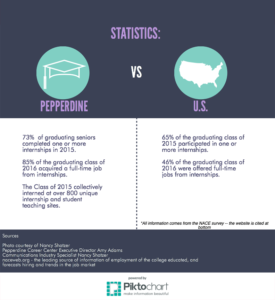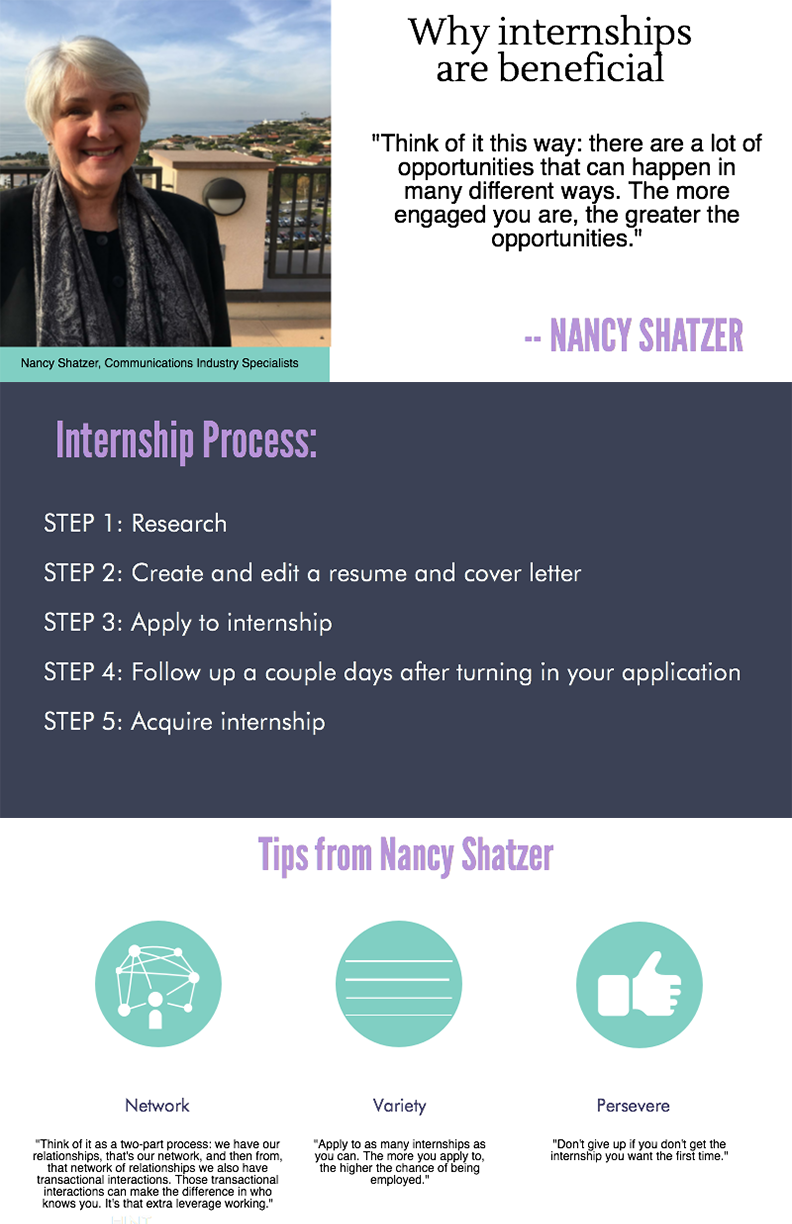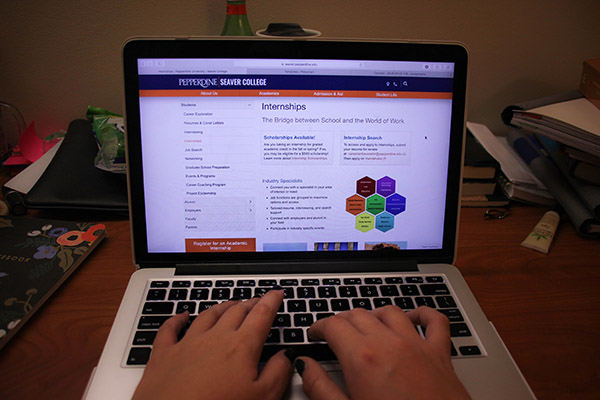
Junior advertising major Katherine Sciortino had just wrapped up an interview with her third prospective internship. As she walked out, her cell phone began to vibrate. She checked the caller ID – an unknown number from Santa Monica. She answered hesitantly and the woman on the other end responded:
“Hello, I am calling for Katherine Sciortino. I would like to formally inform you that you have been accepted for the position of marketing intern here at Malloy & Co.”
Sciortino jumped for joy; the first internship she applied for had called her back after two days. The hours of perfecting her resume and cover letter had paid off.
Just like Sciortino, students across the globe work to sum up their skills and professional work experience on one piece of paper, hoping to set themselves apart.
Internships are an integral component of acquiring a job post-graduation, and university officials now recommend students do at least three to gain necessary work experience. However, that is easier said than done. Students often struggle to land worthwhile internships, find it difficult to manage the time requirements, and stress about the financial implications of committing to what is often unpaid work.
“Internships are beneficial,” said Nancy Shatzer, a communication industry career specialist at Pepperdine. “You can see what you don’t want to do as opposed to spending four years in higher education thinking you’re going to do x, y and z and then come to post-graduation, you get a job and start to think ‘Wow, this is not for me.’”
The internship process is steadily evolving
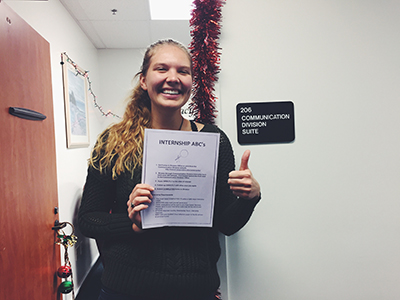
Higher education institutions and employers recognize the value of professional work experience. Only a few majors and minors formally require internships as part of the degree requirements, including all communication majors, the social work minor, Social Action and Justice Colloquium participants, the television and screenwriting major, and the theater major, according to the 2016-2017 Seaver Academic Course Catalog.
“Communication internships are mandatory for students who want to break into the communication field,” said Debbie Wideroe, a visiting professor of communication and director of the communication internships. “If you don’t have experience, you won’t get a job — it’s that simple. The expectation of the business world is that you have two or three internships before you graduate. The Communication Division must be doing something right because we have the highest percentage of students who intern to get a job right after school.”
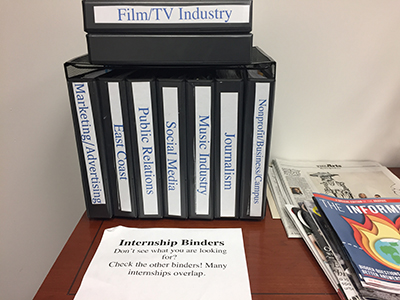
Advisers for other majors suggest or require some other type of work experience. For example, the Service Leadership Project (BA 498) is required for business majors. It requires students to form consulting teams to serve a municipal agency, charitable organization, social service agency or private business in a distressed area.
“(An internship) is not required for my major, but it is heavily suggested,” said Terra Atwood, a junior sports medicine major. “Sports medicine is more about getting out there and getting experience through volunteering.”
Internship requirements are not new to universities. The internship process, however, has evolved.
The current model for acquiring internships is asking what you know, who you know and who knows you, Shatzer said. Recommendations are critical to getting an internship.
The Pepperdine Career Center recommends meeting with one of the center’s industry specialists, updating and tailoring the resume and cover letter to each internship and seeking an internship that offers substantial experience.
The Career Center also recommends using Handshake to help find an internship. Handshake is an online resource that allows students to access thousands of internships in the Greater Los Angeles area and beyond, schedule appointments with the Career Center, build an online resume and register for professional networking events.
Career Services Executive Director Amy Adams suggests reading the fine details of the internship. Different internships may have different requirements per application.
“Students can apply via Handshake or directly from the company’s website,” Adams said. “Sometimes there are other ‘application’ forms that need to be completed that request past work history, contact information, references, educational information, etc. Some industries require applicants to complete assessments or background checks as well.”

Networking is crucial.
Amanda Cruz, a junior studying integrated marketing communication, landed two internships using family connections.
Her first internship was for the District Office of Congresswoman Madeleine Bordallo of Guam. Cruz’s godmother put in a word to the district director and her mother spoke to the congresswoman’s secretary, who is a distant cousin of Cruz’s mother.
Cruz’s second internship was for the Bank of Guam as a financial intern. Her uncle spoke to an old friend of his who held a prominent human resources position at the bank.
“Without these recommendations, I don’t know how I would have gotten an internship,” Cruz said.
Advantages versus disadvantages
Before applying, students should weigh the pros and cons of internships.
Some advantages include gaining work experience, increasing hiring potential and developing professional skills, Shatzer said.
“I think it is somewhat of a hassle, but it’s very beneficial in the long run,” said Chandler Smith, a junior political science and integrated marketing communication double major. “It gives you professional experience and helps you stand out in a highly competitive job market.”
Adams believes that internships bring many benefits to students.
“Internships are one of the top things employers look for in their candidates,” Adams said. “They give students the chance to test the waters of a field or industry, build skills, build a network and learn about organizational culture and different types of jobs. It can be just as important to rule out possible career paths as to build experience. I think combining practical learning with theoretical learning is one of the most enriching experiences students can have. It also can help students mature and prepare to transition more successfully into professional roles post college or graduate school.”
Some disadvantages include the time commitment, menial work tasks and lack of pay.
“I have to do an internship, but I haven’t done one yet,” said Christina Zimmerman, a junior public relations major. “I have a lot of extra-curriculars that are already hefty time commitments. I plan on doing an internship this summer when I have time.”
The debate between paid and unpaid internships
Cruz acquired two paid internships over the summers of her freshman and sophomore years.
“While I was not stressed with school work, I was stressed with gas and other things,” Cruz said. “I am fortunate enough to have landed two paid internships. It was nice because my parents didn’t have to worry about paying for my gas or lunch.”
Some 71 percent of employers provide paid internships, according to the College Employment Research Institute’s 2015 – 2016 Recruiting Trends Report Brief. The rest are a combination of unpaid internships or internships that come with a stipend instead of an hourly wage.
Recently, lawsuits such as the “Black Swan” case have brought unpaid internships to the national stage.
The “Black Swan” case brought to light the concerns of interns doing what should be classified as paid work, Noam Scheiber wrote in The New York Times. Two interns for Fox Searchlight, who worked on set during the making of “Black Swan,” filed a lawsuit against their employer for using them as free labor. Since then, Hollywood agencies and studios shifted to paid internships.
The Fair Labor Standards Act regulates minimum wage and overtime for workers in the U.S., including interns. There is a six-factor test to determine whether interns should be paid, specifically in private businesses. The factors express that interns are there temporarily to gain experience and educational training, not to do menial tasks that only benefit the employer or to save labor costs on traditional employees.
“For those just starting out professionally in their first year or as a sophomore, an unpaid internship in some industries can be extremely beneficial,” Shatzer said. “If you have a particular skill set that you bring to the internship and one the employer didn’t train you to do, then of course the internship should be be paid and should be in compliance with the Fair Labor Standards Act.”
While both paid and unpaid internships are beneficial for students, the debate over unpaid internships is about more than legality, according to Intern Bridge Inc.’s study at Michigan State University. Regardless of the value internships provide, students with financial needs often cannot afford to participate in unpaid internships.
To help alleviate the financial stress internships can cause, Pepperdine offers a $500 scholarship to those enrolled in an internship course based on financial need.
Derek Thompson described the value of internships in terms of economics for The Atlantic. Economists and business people work for a return of investment. When companies have a financial investment in someone — put them on payroll — they are more willing to hand out resources and give incentives to achieve a full return of investment. For unpaid internships, the company is able to capitalize on a student’s previous skill without giving them any supplemental experience.
Although paid internships are ideal, it reduce the number of intern spots available, Nikki Finke wrote in a Deadline Hollywood article.
Businesses have to look at the economics of having multiple interns. Paying interns may lead a business to reduce the number of interns, making it harder for students to break into their desired industry, Thompson wrote.
Nadine Hanley completed this story in Dr. Christina Littlefield’s fall 2016 Jour 241 class.

